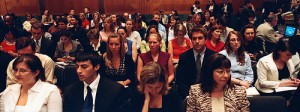With an economy larger than most countries in the world, how can the state of California be in so much financial trouble? NPR is taking an in-depth look at how the Golden State went broke, and what’s being done to dig out with a series called California in Crisis.
San Francisco’s KQED has a collection of economic coverage that tracks the California situation, including reports on how small businesses are coping and whether the downturn is actually creating opportunity for the state’s tech hubs in Silicon Valley.
And NewsHour talked to Patchwork Nation’s Dante Chinni about the foreclosures in monied burbs — a key community in struggling California.
Listen to the interview here: Foreclosures in Monied Burbs? and read the full report.
